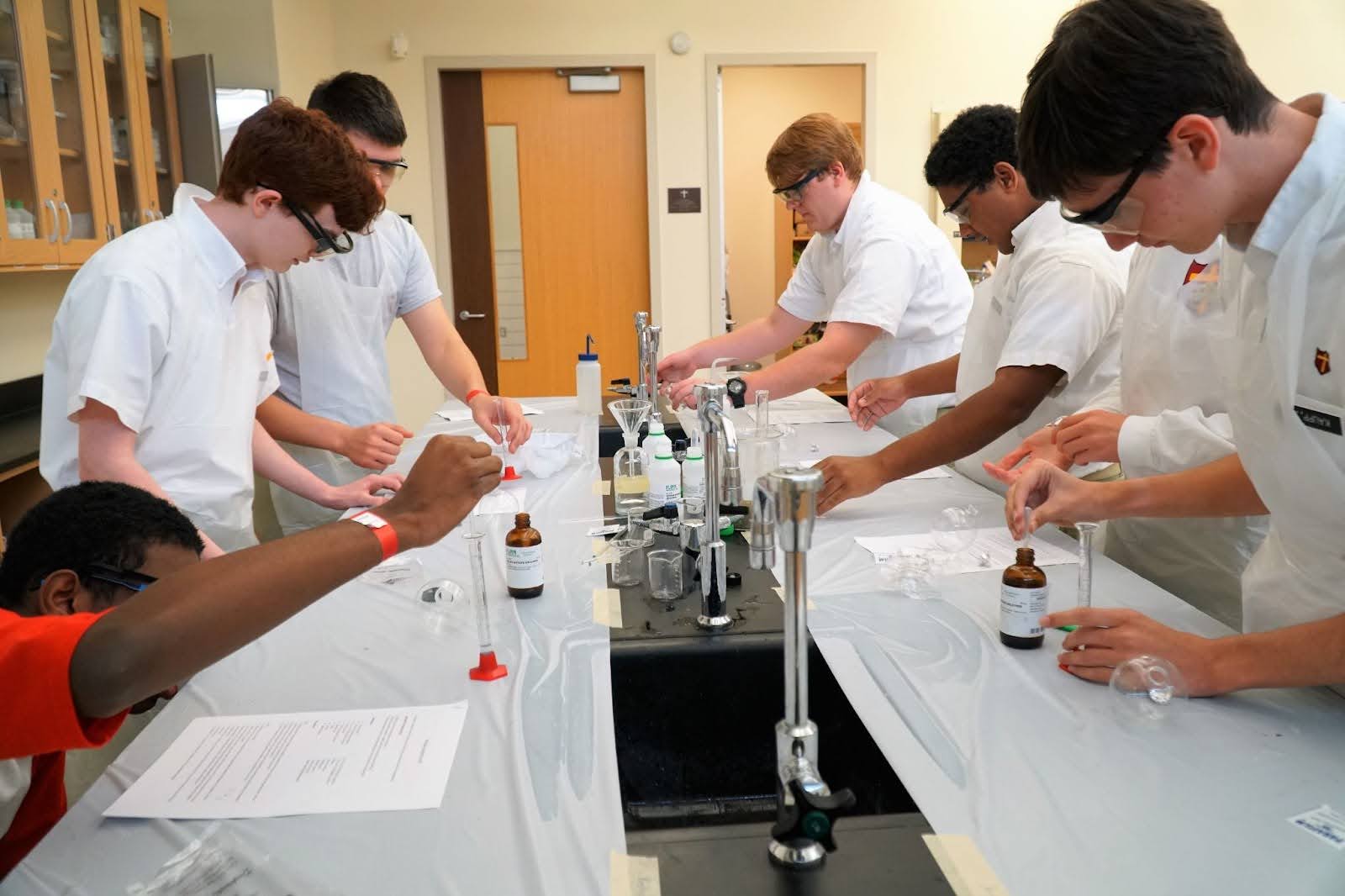Deciding which Advanced Placement (AP) courses to take can be a challenging yet crucial part of a high school student's journey. Among the sciences, AP Chemistry stands out as both a demanding and rewarding option.
This beginner-friendly guide is designed to help you navigate the decision of whether AP Chemistry is the right choice for you. We'll explore how it compares to other AP science courses, delve into the specific topics covered, and break down the exam format.
Additionally, we'll discuss the potential benefits and considerations of taking this course. Whether you're a budding scientist or simply weighing your options, this guide aims to provide clear and helpful insights into the world of AP Chemistry.
Should I Take AP Chemistry or Normal Chemistry?
Choosing between AP Chemistry and regular Chemistry depends on your academic goals, interest in science, and readiness for a challenging curriculum.
AP Chemistry is more rigorous and in-depth than standard Chemistry, offering college-level material and a faster pace. It's ideal for students who are passionate about science and looking to challenge themselves academically.
How AP Chemistry Compares to Other AP Science Courses
AP Chemistry is one of several AP science courses available, each with its own focus and level of difficulty. Understanding these differences is key to selecting the course that best aligns with your interests and academic aspirations.
Is AP Chemistry Harder Than Physics?
Comparing AP Chemistry and AP Physics depends largely on your strengths and interests. AP Chemistry involves a deep understanding of chemical concepts, theories, and laboratory techniques.
In contrast, AP Physics is more focused on the principles of physics and often requires strong mathematical skills. If you're more inclined towards understanding the workings of the natural world through mathematical concepts, AP Physics might be more appealing.
Conversely, if you're fascinated by the composition, behavior, and properties of matter, AP Chemistry could be the better fit.
Is AP Chemistry Harder Than AP Biology?
Similarly, the difficulty of AP Chemistry compared to AP Biology varies based on your preferences. AP Biology is centered around living organisms and life processes, requiring a good deal of memorization and understanding of complex biological systems.
AP Chemistry, on the other hand, demands a strong foundation in chemical concepts and problem-solving skills. If you have a keen interest in molecular interactions and chemical reactions, AP Chemistry might be more suitable for you.
What Does AP Chemistry Cover?
AP Chemistry provides a comprehensive exploration of various chemical concepts and principles. This course is designed to give students a college-level understanding of chemistry. Below is a breakdown of the key topics covered:
- Atomic Structure and Properties: This fundamental topic delves into the structure of atoms, electron configurations, and periodic trends. Understanding these concepts is crucial for grasping the basics of chemistry.
- Chemical Bonding: Here, students learn about the different types of chemical bonds (ionic, covalent, metallic), bond polarity, and molecular geometry. This section forms the basis for understanding how atoms combine to form molecules.
- Chemical Reactions and Stoichiometry: This unit covers balancing chemical equations, types of chemical reactions, and stoichiometry (the quantitative relationship between reactants and products in a chemical reaction).
- Gasses and Solutions: Students explore the properties and behaviors of gases and solutions, including gas laws and the concept of molarity in solutions.
- Thermodynamics: This topic deals with the study of energy changes in chemical reactions, encompassing concepts like enthalpy, entropy, and free energy.
- Kinetics: Kinetics involves the study of reaction rates and the factors that affect them, providing insights into how chemical reactions occur.
- Equilibrium: Here, students learn about the dynamic balance in reversible chemical reactions and the factors that affect equilibrium.
- Acids and Bases: This unit covers the properties of acids and bases, pH, and the concept of acid-base equilibria.
- Electrochemistry: This final topic explores the chemical changes caused by the flow of electrical current and includes the study of redox reactions and electrochemical cells.

What Is the AP Chemistry Exam Like?
The AP Chemistry exam is a comprehensive assessment that tests your knowledge and understanding of the material covered in the course. It consists of two main sections: multiple-choice and free-response.
-
Multiple-Choice: This section comprises approximately 60 questions, accounting for 50% of your total score. These questions test your ability to apply chemical concepts, interpret and analyze data, and think critically about various chemistry problems.
- Free-Response: The free-response section, also making up 50% of your score, includes seven questions: three long-answer and four short-answer. This part assesses your ability to solve problems in a detailed manner, including your understanding of chemical equations, the ability to explain chemical phenomena, and the skills to design and describe chemical experiments.
How Is the AP Chemistry Exam Scored?
Scores on the AP Chemistry exam range from 1 to 5, with 5 being the highest. The multiple-choice section is scored by machine, while trained AP teachers and college faculty members score the free-response questions.
The total score from both sections is combined and scaled to determine your final AP score. Colleges typically consider AP scores of 3 or higher as passing, with many granting college credit for scores of 4 or 5.

Is AP Chemistry Worth Taking?
AP Chemistry is a course that offers substantial rewards for students who are willing to embrace its challenges.
It provides a deep understanding of chemical principles, enhances critical thinking skills, and can be impressive on college applications, especially for those interested in science, technology, engineering, or math (STEM) fields.
Furthermore, successful completion of the AP exam can lead to college credit, potentially saving time and money in your future academic endeavors.
When Should You Take AP Chemistry?
Choosing when to take AP Chemistry should be based on your academic readiness and course availability. Typically, students take this course in their junior or senior year of high school.
Before enrolling, it’s advisable to have a strong foundation in basic high school chemistry and, if possible, completion of Algebra II, as these will help in understanding the more complex concepts presented in AP Chemistry.
It’s also important to consider your overall course load; AP Chemistry is time-intensive and requires a significant commitment to study and laboratory work.
Conclusion: Is AP Chemistry Right for You?
In conclusion, deciding whether to take AP Chemistry boils down to your personal interests, academic goals, and readiness for a challenging course. It’s an excellent choice if you have a strong interest in science, particularly chemistry, and are eager to engage with college-level material while still in high school.
The course is demanding but can be incredibly rewarding, offering deep insights into the chemical world and preparing you for future academic pursuits.
Consider your current academic strengths, workload, and future aspirations. If you're excited about exploring the complexities of chemistry, developing critical thinking skills, and willing to commit to rigorous study, then AP Chemistry could be a great addition to your academic portfolio.
Ultimately, the decision is yours, and it should align with your educational and career aspirations. AP Chemistry is not just about earning college credit; it's about embarking on a journey that challenges and enriches your understanding of the natural world.
Looking for more information about AP Chemistry?
Download our comprehensive class guide by clicking the thumbnail below, or visit our AP Chemistry page to learn more about tutoring support.


